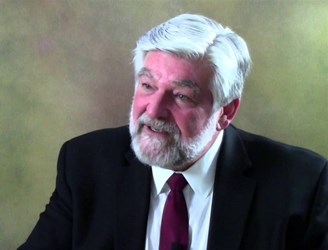ACRES: Ready To Improve The Conduct And Quality Of Clinical Trials
By Ed Miseta, Chief Editor, Clinical Leader

Greg Koski, co-founder and CEO of the Alliance for Clinical Research Excellence and Safety (ACRES), is a big believer in systems. With the proper system in place, the ability exists to apply basic engineering principles—as well as the lessons from other highly regulated, multi-stakeholder industries (such as air transport and energy) that have applied systems thinking and designs—to complex operational processes. In doing so, each component in the process can be made to work seamlessly, efficiently, and in an interoperable manner with other critical components.
“That's what a system is all about,” says Koski. “It's not just the sum of the individual components; it's the synergy of the whole that results when all the pieces are working together properly, monitoring and feeding back information about safety and performance.” Not surprisingly, this is the vision Koski had in mind for clinical trials when he founded ACRES.
The nonprofit ACRES operates in the public interest, taking a multi-stakeholder approach, forming a true alliance united behind the goal of collaboratively building a system for the clinical research process, based in principles of Accountable Research™. A group of over 120 experts from around the world have already put a lot of time, thinking, and effort into examining the process, identifying key components, and how the industry can get there in a reasonable amount of time. Many agree the approach is long overdue.
ACRES studied the clinical trials process in depth and identified four key operational areas: site development and support; information technology; quality management; and safety and pharmacovigilance. Selecting the operational areas was important. The ACRES team recognized that building a system to improve clinical trials would have to include a globally interconnected network of sustainable, professional high-performing sites with a shared information platform to provide a universal interface for them to all interact. It also became clear that the data would have to be stored in a database to support key processes – and not only the aforementioned quality management and safety, but also performance and compliance that cuts across stakeholders from regulators and ethics committees to patients, sponsors, CROs, and sites.
Building A Network – Piece By Piece 
ACRES and its allies are currently building the network and there are also multiple projects underway in each operational area. “It's what we describe as a matrix development,” Koski says, “similar to building the space shuttle. You can't always build things in a sequential manner. Sometimes you have to build the pieces concurrently, with awareness of each across the endeavor, so they'll properly snap together, when ready, into one complete integrated system.”
It is parallel processing on steroids.
Within the site development and support domain, ACRES is now in the third phase of an effort to create globally accepted standards for accreditation of clinical research sites. Koski believes this will accomplish a number of goals, the most important being that it will promote professionalism, integrity, quality, and safety at clinical research sites around the world. This effort will hopefully cut down on the number of ‘one and done’ sites that do no more than one clinical trial in their lifetime. Additionally, the effort will ensure sites operate at a level of performance that is consistent around the world. “Sustainability is the bottom line.”
Teams are being assembled to develop standards in several specific domain areas, including facilities, information systems, professional personnel, quality management, patient enrollment and recruitment, and administrative policies and procedures. Other teams are also working on standards for research across special populations, such as Phase 1, pediatrics, and the vulnerable, including the aging and the challenged.
The standards development teams are currently seeking nominations and volunteers. The teams will be operational soon and will then begin the work of performing surveys and collecting information to determine and reconcile the standards being used around the world to monitor performance at clinical research sites.
“We are not starting from scratch; we intend to utilize what currently exists and leverage it to the fullest extent possible,” says Koski. “That makes for a more coherent and expeditious process, and will enable us to get this up and running as soon as possible—we are shooting for a 2016 launch once pilot testing is completed.”
While developing standards, ACRES is also working to develop a process for supporting accreditation, whatever the accrediting body may be. This would include a neutral oversight entity that would house and maintain standards, revise and update them, manage the accrediting bodies around the world, and oversee the process. The end goal is to operate accreditation efficiently and preserve its integrity.
“A key message that needs to be appreciated by all stakeholders is that this process for accreditation cannot place another layer of administrative burden and oversight on the business and science of drug development,” notes Koski. “In fact, it is the opposite. By utilizing information that is already collected automatically during the routine conduct of business, we can use this process of Dynamic Accreditation to not only help sites to improve their performance and profitability, but also recognize and reward with incentives those high performing sites of excellence.”
Koski believes the industry now recognizes this was an investment that should have been made years ago. The value of having a network of reliable, professional high performing sites cannot be overstated. It took an evolution of the industry and its global expansion but this is now not only possible but feasible.
Strive For Continuous Site Improvement
ACRES will soon be launching an enhanced registration campaign, where the Alliance will work through more than 70 strategic allies to encourage sites to register to become affiliated sites of the ACRES Global Network.
Sites that register will be provided a menu of products and services, mostly free, that will help them assess their current level of performance and assist with improving their performance through education, technology tools, and a host of opportunities that will be made available at the time of registration.
Koski states the high-performing research site is the fundamental building block of the network. The other key piece will be to put together a shared, open information platform that will allow sites to not only interact with sponsors, regulators, CROs, and patient groups, but to also create pathways for a secure flow of information. These pathways will allow for the implementation of critical functionalities, particularly in the areas of operations assessment and improvement, overall quality management, remote risk-based monitoring and auditing, and online inspections by regulatory agencies. All of these are necessary activities, and ones that can be dramatically streamlined and improved through the more effective application of information technology.
“To begin this work, we have put together a consortium of seven technology companies and three standards organizations,” says Koski. “The latter include CDISC, OASIS-CareLex and the SAFE Biopharma Association. Others will join the process in the future. This consortium will work together to build a universal interface that will allow stakeholders to appropriately connect, share, and use information effectively.”
That may sound like a big undertaking, but using a consortium approach that leverages already existing and proven technologies makes the undertaking manageable, enabling ACRES to build an open, shared information platform accessible to anyone who wants to use it in a more efficient, less costly fashion than would otherwise be possible. The project also involves the creation of a unified safety database that integrates individual personal health information with drug safety information, enabling real time pharmacovigilance in a way that has not been done before.
Don’t Forget Quality And Security
An additional initiative, being conducted with the SAFE BioPharma Association, will map the data flow through the entire drug development process. This will be done from a security rather than an operations perspective.
“We need to ensure that we identify, at every step in the process, all of the points where security is critical,” says Koski. “We will then determine where a digital signature is needed, where some form of authentication or validation is needed, and what the level of security is required. This is something that has never been done.” Essex Management, a strategic ally, will be working to ensure that all projects move forward in a well-coordinated and timely fashion.
Another initiative, the Global Ethics and Regulatory Innovation project (GERI), works in conjunction with the Centre for Innovation in Regulatory Science (CIRS), an independent, nonprofit organization working with regulatory agencies to apply next generation thinking to the regulatory processes. The current process for regulation in drug development hasn't changed in the fifty years since the regulatory agencies required that data support the safety and efficacy of a drug before it could be marketed. Koski feels this is unacceptable.
“The GERI initiative is pulling together key stakeholders and experts from around the world to look at these combined processes of ethical review and regulatory oversight with a view towards understanding how we can achieve the appropriate oversight and safety both during testing and after marketing of therapeutic products.” he says, “Specifically, we hope to get away from simply achieving compliance with a set of regulations that may no longer be serving our interests, and instead focus on the job that we need to do in light of the many changes that have occurred over the years.”
Koski notes there are still other projects in the works, all in various stages of development, and all integral parts of a true system. Each has a team of experts from around the world steering the effort and ensuring they are done on an inclusive, global basis.
“You can't build a global system if you're only looking at this from the perspective of one interest group, be it sponsors, CROs, sites, or regulatory agencies, or of just one country” he adds. “We need to bring everyone together, including patients, in a truly multi-stakeholder global effort. This will require a systems mind-set with a commitment to collaborative effort and we believe the alliance models we have developed are unique in that regard. We believe we are not just bringing people together, but are doing it with a real focus on creating innovative and implementable solutions.”
For Koski, these initiatives are just the beginning. With nearly 80 strategic allies already engaging, ACRES seeks to eventually work with other organizations active in the clinical space, both in the US and globally, including the Clinical Trials Transformation Initiative (CTTI), C-Path, TransCelerate, the Society for Clinical Research Sites and many other like-minded organizations around the world.
“This is not something that can afford to take ten years to do,” he says. “We need to get this done now, and working together, I have no doubt that we can.”
